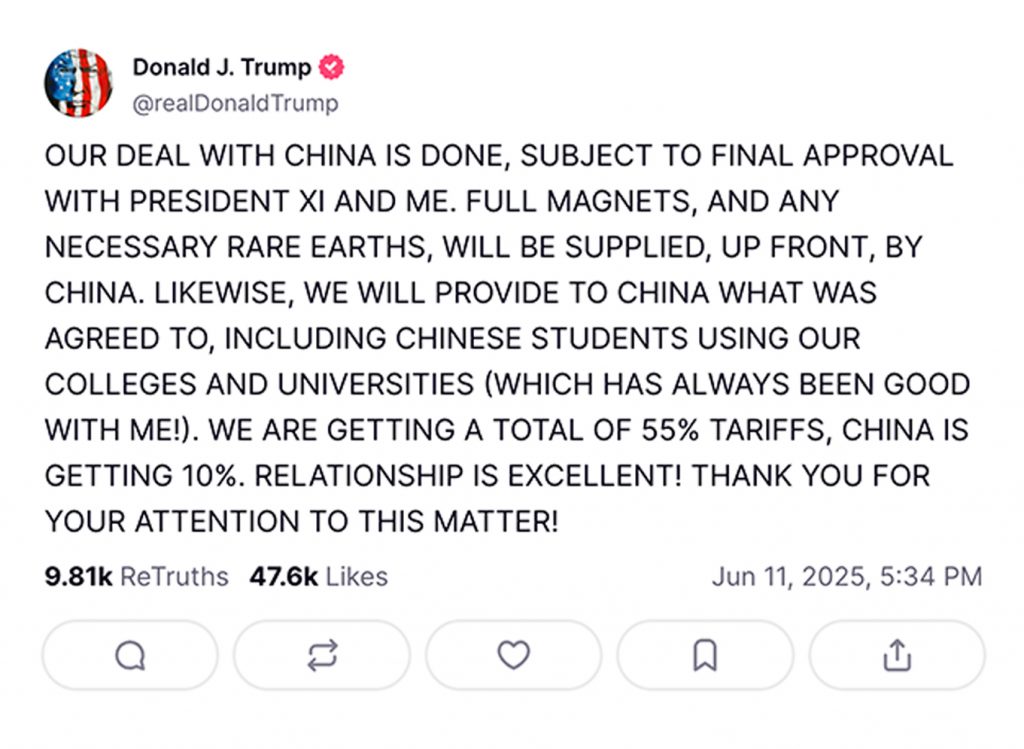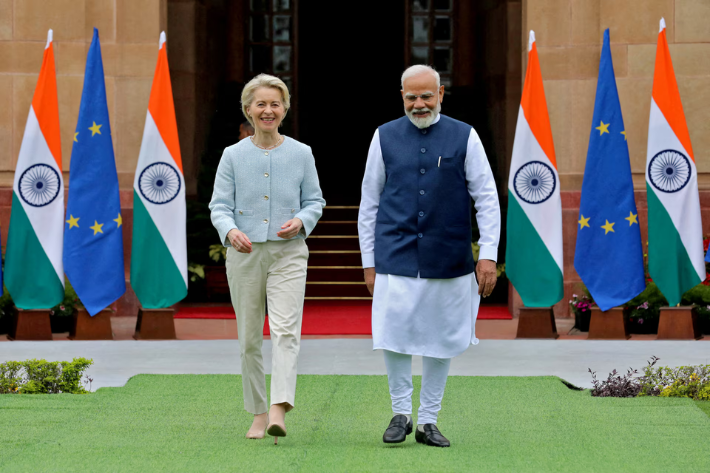Officials from the US and China have agreed on details of a trade deal after two days of talks in London.
US President Donald Trump said the deal covers export tariffs and will remove Chinese restrictions on the export of rare earth minerals, while Chinese students will be able to access universities in the United States.
Trump took to his social media platform to offer some of the first details to emerge from two days of marathon talks held in London that, in the words of US Commerce Secretary Howard Lutnick, put “meat on the bones” of an agreement reached last month in Geneva to ease bilateral retaliatory tariffs that had reached crushing triple-digit levels.
ALSO SEE: Cambodian Scam Centres Straining Ties With States Near And Far

“Our deal with China is done, subject to final approval with President Xi and me,” Trump said on the Truth Social platform. “Full magnets, and any necessary rare earths, will be supplied, up front, by China. Likewise, we will provide to China what was agreed to, including Chinese students using our colleges and universities (which has always been good with me!). We are getting a total of 55% tariffs, China is getting 10%.”
55% tariff explained
A White House official said the 55% represents the sum of a baseline 10% “reciprocal” tariff Trump has imposed on goods imported from nearly all US trading partners on April 2; plus 20% on all Chinese imports because of punitive measures Trump has imposed on China, Mexico and Canada associated with his claim that the three facilitate the flow of the opioid fentanyl into the US; and pre-existing 25% levies on imports from China that were put in place during Trump’s first term in the White House.
Lutnick said the 55% rate for Chinese imports is now fixed and unalterable. Asked on Wednesday on CNBC if the tariff levels on China would not change, he said: “You can definitely say that.”
Still, many specifics of the deal and details for how it would be implemented remain unclear.
US Treasury Secretary Scott Bessent told US senators that the deal would not reduce US export restrictions on high-end artificial intelligence chips in return for access to Chinese rare earths.
“There is no quid pro quo in terms of chips for rare earths,” Bessent told a Senate Appropriations subcommittee hearing.
China confirms deal
China on Thursday confirmed the agreement announced by President Trump, saying both sides needed to abide by the consensus and adding China always keeps its word.
“China has always kept its word and delivered results,” Lin Jian, a foreign ministry spokesperson, said at a regular news conference. “Now that a consensus has been reached, both sides should abide by it.”
Officials from the two superpowers had gathered at a rushed meeting in London starting on Monday following a call last week between Trump and Chinese leader Xi Jinping that broke a standoff that had developed just weeks after the preliminary deal reached in Geneva that had defused their trade war.
The Geneva deal had faltered over China’s continued curbs on critical minerals exports, prompting the Trump administration to respond with export controls preventing shipments of semiconductor design software, jet engines for Chinese-made planes and other goods to China.
Lutnick said the agreement reached in London would remove restrictions on Chinese exports of rare earth minerals and magnets and some of the recent US export restrictions “in a balanced way,” but did not provide details after the talks concluded around midnight London time (7pm EDT).
“We have reached a framework to implement the Geneva consensus and the call between the two presidents,” Lutnick said, adding that both sides will now return to present the framework to their respective presidents for approvals.
“And if that is approved, we will then implement the framework,” he said.
In a separate briefing, China’s Vice Commerce Minister Li Chenggang also said a trade framework had been reached in principle that would be taken back to US and Chinese leaders.
No details yet, markets mixed
Trump’s shifting tariff policies have roiled global markets, sparked congestion and confusion in major ports, and cost companies tens of billions of dollars in lost sales and higher costs.
US stocks drifted lower on Wednesday but have recouped most of the losses suffered earlier in the spring during Trump’s wave of tariff announcements.
“It’s a done deal, according to President Trump, but we haven’t seen any details, which is why I think the market is not reacting to it yet. As with just about everything, the devil is in the details,” said Oliver Pursche, senior vice president and adviser at Wealthspire Advisors in Westport, Connecticut.
The World Bank on Tuesday slashed its global growth forecast for 2025 by four-tenths of a percentage point to 2.3%, saying higher tariffs and heightened uncertainty posed a “significant headwind” for nearly all economies.
The US-China deal may keep the Geneva agreement from unravelling over duelling export controls, but does little to resolve deep differences over Trump’s unilateral tariffs and longstanding US complaints about China’s state-led, export-driven economic model.
“If China will course correct by upholding its end of the initial trade agreement we outlined in Geneva – and I believe after our talks in London, they will – then the rebalancing of the world’s… two largest economies is possible,” Bessent told a separate House of Representatives hearing hours after returning from the London talks.
The two sides left Geneva with fundamentally different views of the terms of that agreement and needed to be more specific on required actions, said Josh Lipsky, senior director of the Atlantic Council’s GeoEconomics Center in Washington.
“They are back to square one, but that’s much better than square zero,” Lipsky added.
It was not immediately clear from Trump’s comments where things stood regarding the timeline for a more comprehensive deal that had been reached last month in Geneva, a deadline set at that time for August 10.
- Reuters with additional editing from Jim Pollard
NOTE: Two paragraphs were added to this report after China publicly confirmed the deal on June 12, 2025.
ALSO SEE:
China Plays Rare Earths Card in EV Tariff Negotiations With EU
China Export Curbs on Rare Earth Magnets: a Trade War Weapon
Lessons From Japan on Tackling China’s Rare Earth Dominance
China’s Exports to US Plunge, as Deflation Hits Two-Year High
China Sets up Tracking System to Trace Its Rare Earth Magnets
Carmakers Stressed by China’s Curbs on Critical Mineral Exports
China Plunders Rare Earth Minerals as Myanmar’s Civil War Rages
US Blocks Chip Design Software, Chemical Shipments to China
China Threatens Legal Action Against Anyone Who Shuns Its Chips
























